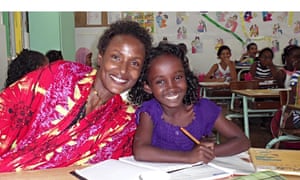When she was three years old, Safa Idriss Nour received something no girl in her slum in Djibouti had been given before – a signed contract from her parents stating they would never inflict genital mutilation on her.
In Djibouti, in the Horn of Africa, an estimated 98% of girls and women have undergone female genital mutilation (FGM), a procedure that usually involves cutting off the clitoris and some of the labia, so this was a remarkable event. Equally remarkable is the story of how Nour came to get the contract and, indeed, of her battle to ensure that her parents stuck to the terms of the deal.
Nour starred in a film adaptation of Desert Flower, the international bestselling autobiography by Somali model and anti-FGM activist Waris Dirie. Published in 1997, her first book follows Dirie from her birth into a nomadic family in Somalia – from whom she fled, aged 13, after her father attempted to marry her to a 60-year-old man – to her becoming an international supermodel.
In 2007, Nour was asked to play the young Dirie as she undergoes FGM – on condition that her parents sign a contract agreeing never to perform the same ritualistic operation on her.
Nour's experience reflects broader tensions that affect communities and activists involved in FGM around the world, and her story has now been documented in Dirie's latest book, Safa: The Rescue of the Little Desert Flower, first published in German and due out in translation in the UK later this year.
The book also provides compelling evidence of the pressures within particular groups, including those in England and Wales, where more than 66,000 women are thought to have undergone FGM and 24,000 girls under 15 are believed to be at risk.
A campaign to persuade the education secretary, Michael Gove, to help end FGM by ordering headteachers in England to educate parents and children about the practice has gathered more than 203,000 signatures since it was launched the week before last. It is backed by the Observer, the Guardian and a range of campaigners.
Dirie's new book begins in 2011, four years after the contract with Nour's parents had been signed, when she received a letter from the girl that suggested her parents were having second thoughts. "I was shocked and I was very angry," Dirie, 48, said. "I decided I had to fly to Djibouti immediately to save my little girl from this brutal crime."
Once in Djibouti, she realised that the family were being ostracised and Nour's fear of being forced to undergo FGM, rather than diminishing, had grown. Then seven, Nour told her: "Grandmother carried out lots of circumcisions in our house. The girls screamed so loudly, just like I did in the film."
Nour's parents confirmed that pressure from neighbours and others for Nour to undergo FGM was weighing heavily on them.
In such places the cutting of a girl's vagina is considered to be a symbol of purity, a sign of commitment to a future husband over a desire for sexual pleasure. In severe cases, the remaining outer labia are sewn together, often without anaesthetic, and only reopened after marriage, to "protect" a girl's virginity.
Traditional or spiritual motivations aside, the procedure is deemed a practical necessity for many parents – without it they cannot get a high bridal price when their daughter is married – if she can get a husband at all.
This is a fear shared by Nour's parents. They told Dirie that her daughter and the family were being treated as outsiders and neighbours were jealous of the financial and medical support they were receiving from Dirie's FGM campaigning charity, Desert Flower Foundation, in return for upholding the contract.
"Safa's family is surrounded by others struggling every day to survive. Even though the families have very little money, they save what money they have to cut their daughters, because otherwise they will not get a bride price from the future husband," Dirie said. "Because of our support, Safa's family is completely independent and the first family in the area to stop the vicious circle. This is a breach of their tradition, and people have big problems with this."
Dirie spent time with the family and took some of them to Europe to show them campaigning work and talk about the corrective surgery carried out by the Desert Flower Foundation. The experience was a turning point, particularly for the father, who once argued strongly with Dirie over cutting Nour. He now works as an activist for the charity.
"Safa's father has even invited neighbours to participate in our programme and the reactions were positive," Dirie said, demonstrating the difference that can be made when campaigns are led from within the communities they are trying to change.
Although the case of Nour's father was a success, trying to encourage broader behaviour change through education is not easy. "Educating communities is very difficult as people are very stubborn and not willing to change their habits even if it is against humanity," says Dirie.

